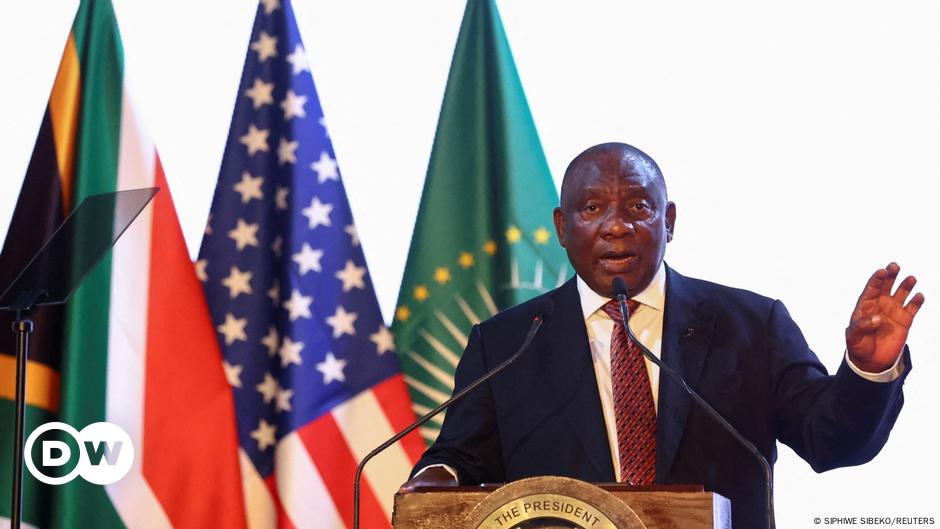As 2025 dawns, African nations are looking out onto an uncertain global political landscape. Russia’s grinding war in Ukraine still has no end in sight, the United States is about to swear in an unpredictable leader in Donald Trump and the European Union’s two biggest economies and perennial trading partners with African countries — France and Germany — are in political turmoil.
“We are often on the back foot whether it’s coming from the West or the East. We are often at the mercy of the ways in which other economic giants deal with us,” said Tessa Dooms, a South African sociologist and political analyst.
Economic turbulence through trade tariffs?
Some of those headwinds may well blow from a Trump-led United States. According to Dooms, the world’s biggest economy is warning that a global trade war might be on the horizon. The US has already signaled its intention to imposed trade tariffs on competitors, like China, but also allies like Mexico and Canada.
“This may impact not just the cost of goods, but also the production value chains of goods from particular regions,” said Dooms.
During his first term as president, Trump seemed to largely ignore the African continent as a trading partner, and many analysts expect more of the same from his second term. In contrast, outgoing President Joe Biden committed around $55 billion (€53 billion) to the African continent in 2022, and visited Angola in December.
But while African nations might not be direct targets of Trump’s threatened trade tariffs or a trade war, countries like China may turn to Africa to soften the blow of difficult trading conditions.
“China has quite strong ties to the African continent and the growing BRICS grouping can definitely see this is an opportunity to strike back at the US, both in terms of where trade and production is happening,” explained Dooms. But she stopped short of saying BRICS (consisting of Brazil, Russia, India, China, South Africa, Iran, Egypt, Ethiopia and the United Arab Emirates) can fill the void.
“There will definitely be opportunities for engagement and reimagining economic trading patterns. The US is definitely underestimating the power of the new kind of economic trading blocs. Even the European Union has options, and has Africa as part of those options,” Dooms told DW.
Africa in 2024: A year of dynamic change
Big tests for new governments
Amid an uncertain outlook, new leaders will be at the helm. Major African elections in 2024 saw incumbents defeated in Senegal, Ghana and Botswana. Voters ousted the Botswana Democratic Party that had been in power for 58 years since independence from the United Kingdom.
In neighboring Namibia, the ruling SWAPO party extended its 34 years in power, but only by a whisker, and scored its worst ever election result. In May, South Africa’s African National Congress was forced into coalition government for the first time in the nation’s democratic history.
While the election results in those countries may present a changing of the guard away from governance dominated by liberation movements, the new leaders of Namibia, Ghana and Botswana are under pressure to deliver on elections promises.
“Generational change is an important factor in the shifting political tectonic plates we are seeing,” political scientist Nic Cheeseman told The Associated Press. “People want jobs and dignity — you can’t eat memories.”
While the election results have worried members of the liberation establishment, many observers see the shift in power in the southern African nations as a signal that democratic processes are working. The exception to this is the disputed election in Mozambique, where post-election violence is believed to have caused the deaths of almost 300 people. Around 13,000 Mozambicans have crossed into neighboring Malawi to flee the violence in recent weeks.
“We need to take some serious stock about where our countries are, what is working, what is not and why is it not working so that we can contribute to the broader global conversation about the future of democracy,” said analyst Dooms. “We can do it from a uniquely African perspective, and ask how we build democracies that are fit for purpose and deliver for the people of Africa rather than just deliver for a few.”
Shocks at the poll may come again, as 2025 will see 11 African nations going through major elections, including Cameroon, the Central African Republic, Egypt, Ivory Coast, Tanzania and Togo.
Mozambicans protest ruling party’s disputed election win
Edited by: Keith Walker
















